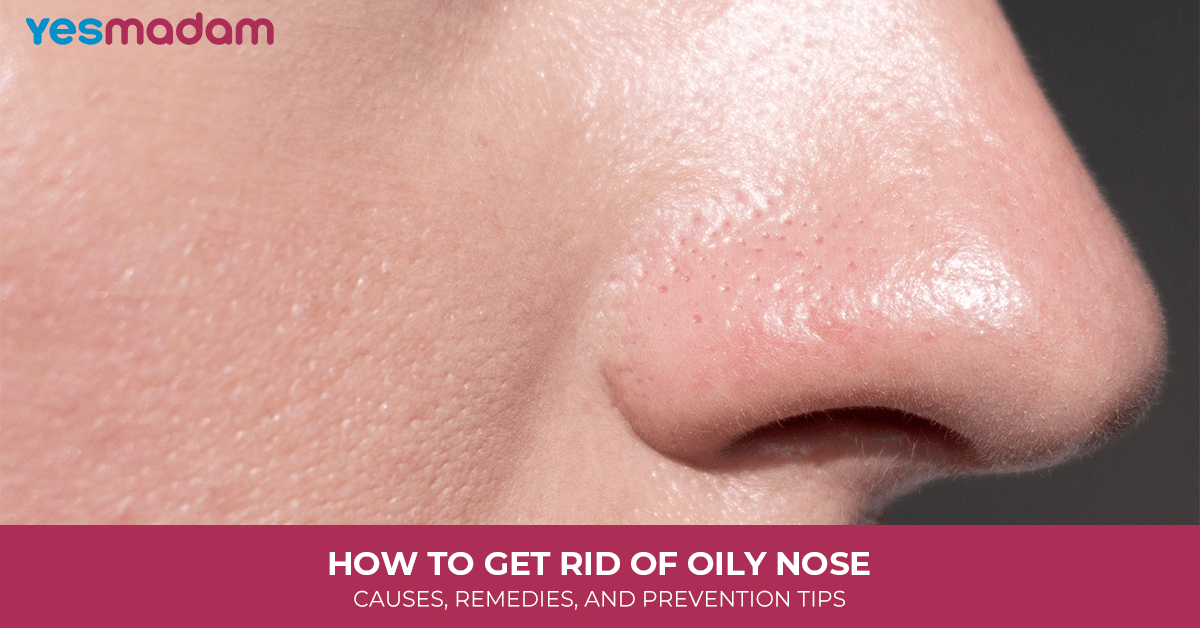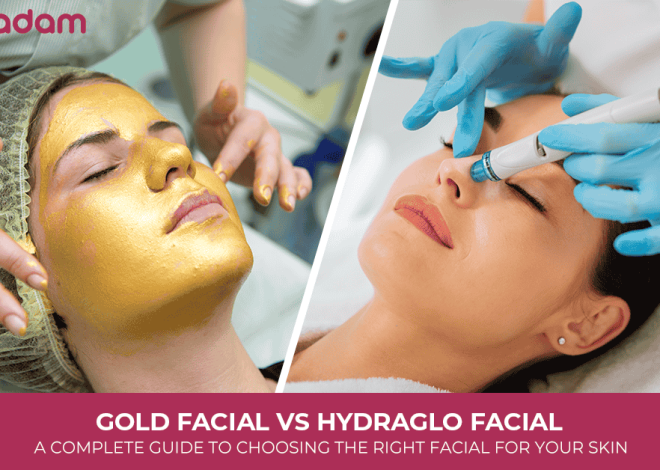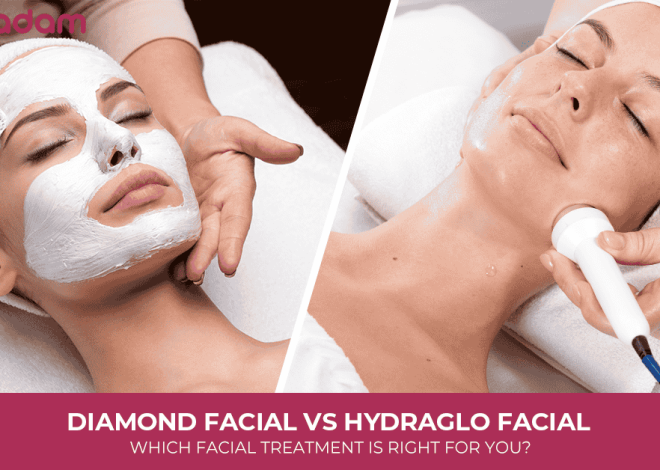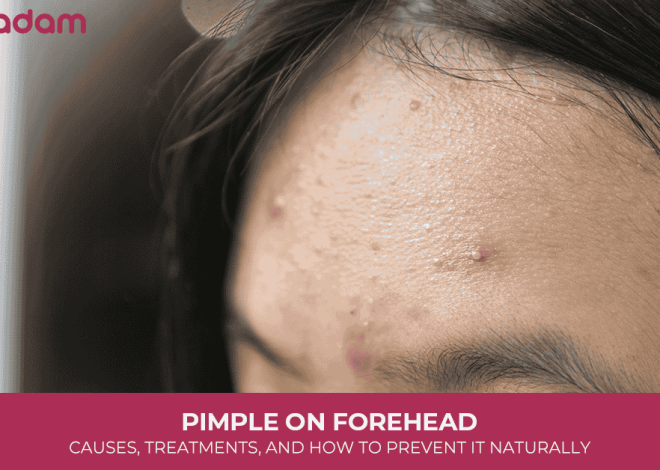
How to Get Rid of Oily Nose: Causes, Remedies, and Prevention Tips
Did this thought ever cross your mind, why your nose outshines the rest of your face? If yes, you‘re not alone because a large percentage of individuals complain about greasiness around their noses.
Let’s explore how to get rid of oily nose through effective routines and treatments, with deep insights on how to manage sebum production and achieve balanced skin.
Table of Contents
Why is My Nose Oily?

Do you often find yourself wondering, “Why is my nose so oily”? Here are some of the common reasons behind what causes oily skin on nose.
- Hormonal fluctuations: Phases of hormonal fluctuation, like adolescence, the menstrual cycle, or stress, may cause overproduction of sebum, making your nose greasy.
- Environmental influences: High levels of humidity and pollution may be a crucial oily nose reason.
- Enlarged pores: Large pores are predominantly visible on the nose. Generally, the T-zone of the face (nose, chin, cheeks, and forehead) tends to generate excess oil due to the pores.
- Sun exposure: Sunlight makes the sebaceous glands secrete more oil to lubricate the skin. Due to this, it may cause increased oiliness around the nose.
- Combination skin: If you have combination skin, only certain parts of your face will feel greasy. For example, your cheeks will feel dry or normal, T-zone ( the chin, nose, and forehead ) will be the oily zones.
How to Prevent Oily Nose?
If you‘re trying to figure out how to treat oily skin on nose, follow these effective skincare hacks for the best results:
Moisturising
Fulfilling the hydration requirements of your skin will help keep sebum levels in check, including those in your nose. Apply a good moisturizer to help balance oil and water on your skin.
Sunscreen
There is considerable research suggesting that UV radiation and other environmental factors may contribute to oiliness. So, face sunscreen is a must-have product in your skincare routine as the best oily nose remedy.
Exfoliating
Exfoliation is a major cure for oily nose when done the right way. Opt for gentle AHA, BHA exfoliants to control sebum production, and keep whiteheads, blackheads, and breakouts at bay, including your nose area.
Washing your face twice daily
Make it a habit to wash your face once in the morning and once before bed, when you have oily skin on the nose and face, to remove dirt, oil, and excess makeup from your nose.
Stay hydrated
Staying hydrated makes oil glands less oily. It’s suggested that you consume at least 2 liters of water every day and stay away from aerated beverages and sodas to reduce oiliness on the nose.
Masks
A good clay mask is an excellent remedy for treating an oily nose. The clay acts like a sponge and absorbs all the excess oil.
Address your diet
Watching your diet is yet another effective remedy for how to stop oily nose, especially if you love spicy foods. These foods cause blood vessels to dilate and trigger perspiration, increasing the appearance of an oily, shiny nose.
5 Best Home Remedies For Oily Nose
Five home remedies to help with an oily nose are: applying an apple cider vinegar (ACV) and water solution, using a Multani Mitti (fuller’s earth) mask, using honey, using a clay mask, and applying tomato pulp.
Here are five home remedies for an oily nose:
- Apple Cider Vinegar Solution:
- How to use: Mix equal parts apple cider vinegar and water. Dip a cotton ball into the solution and apply it to your nose for 15 minutes, then rinse with cold water.
- Why it works: Apple cider vinegar is an excellent astringent that can help absorb surplus oil and cleanse the skin.
- Multani Mitti (Fuller’s Earth) Mask:
- How to use: Mix Multani Mitti with water to form a paste and apply it to your nose.
- Why it works: This powder works as a natural blotter, absorbing oil and impurities, leaving the skin feeling fresh.
- Honey:
- How to use: Apply a thin layer of raw honey to your nose and leave it on for 10 minutes before rinsing with water.
- Why it works: Honey has natural antibacterial and antiseptic properties that can help prevent issues like acne and control oily skin.
- Clay Mask (Bentonite or Kaolin):
- How to use: Mix bentonite or kaolin clay with water to create a paste and apply it as a mask to your nose.
- Why it works: Clay masks are great for sebum control, acting like magnets to draw out excess oil and impurities from the pores.
- Tomato Pulp:
- How to use: You can either apply tomato slices to your nose for 10 to 15 minutes or create a mask by mixing tomato pulp with a teaspoon of sugar and gently massaging it onto your nose before rinsing.
- Why it works: The acids in tomatoes help absorb excess oil and can also unclog pores.
How to Make Your Nose Less Oily: Ingredients, Lifestyle Changes, and Final Skincare Tips
Dealing with an oily nose requires a comprehensive approach, including the right ingredients, lifestyle, and skincare tips as highlighted below:
Ingredients that reduce an oily nose
| Ingredient | Use for oil control |
| Zinc PCA | Mattifies the skin and absorbs excess oil. |
| Witch hazel | Removes excess oils and nurtures the skin’s delicate barrier for optimal healing. |
| Grape seed oil | Regulates oil levels while removing pore-clogging impurities and dead skin cells. |
| Salicylic acid | Unclogs pores, removes excess sebum, and reduces an oily nose. |
| Niacinamide | Refines and minimises enlarged pores to keep oiliness around your nose in check. |
Lifestyle changes to combat an oily nose
- Hydration: Ensure hydration by drinking plenty of water to maintain a balanced skin tone.
- Balanced diet: Maintain a balanced diet filled with vegetables, fruits, lean proteins, and healthy fats while reducing intake of greasy and sugary foods to control oil production.
- Stress relief practices: Include stress relief techniques like yoga, meditation in your everyday routine, and keep yourself active to regulate hormones and improve circulation.
Final Skincare Tips For Managing Your Oily Nose
- CTM routine: Stick to a cleansing, toning, moisturising skincare routine diligently both morning and night to effectively control oiliness.
- Remove makeup before bed: Refrain from wearing heavy makeup and remove makeup before bed.
- Do not overwash your face: Washing your face frequently can backfire. Repeated washing can dry your face, and sebaceous glands may respond by producing even more oil.
- Do not use harsh skincare products: Avoid fragrant, harsh skincare products that strip the face of its natural moisture.
- Avoid touching your face: Resist the urge to touch your face. This may spread oil from your hands to your nose.
Conclusion
At the end of the day, consistency plays a key role in your never-ending quest for how to get rid of oily nose. Follow a consistent skincare routine, best skincare hacks with lifestyle tips, or ingredients to look for, or effective home remedies to achieve a balanced skin complexion without any hassle.
FAQs
How to get rid of oily face and nose?
To reduce an oily face and nose, use a gentle, salicylic acid cleanser twice daily, apply oil-free moisturizer and sunscreen, use blotting papers for on-the-go oil absorption, and incorporate a weekly clay mask.
Why is my nose oily but my face is dry?
Your nose is oily and your face is dry due to combination skin, a common skin type where the T-zone (forehead, nose, and chin) has more sebaceous glands, leading to increased oil production.
Is an oily nose healthy?
An oily nose is not inherently unhealthy but can indicate overactive sebaceous glands and lead to issues like enlarged pores or acne.
Does an oily nose mean high testosterone?
An oily nose is not a definitive sign of high testosterone, though high testosterone levels can lead to increased sebum production and thus oilier skin.
Does a shiny nose mean oily skin?
Yes, a shiny nose is a symptom of oily skin, especially in the T-zone (forehead, nose, and chin), because the sebaceous glands in that area overproduce sebum, a natural oil that causes a greasy or shiny appearance.
Can I completely get rid of an oily nose?
No, you can’t permanently stop oil production, as sebum is essential for skin protection. However, with the right skincare routine—like gentle cleansing, oil-free moisturizers, and mattifying products—you can significantly reduce shine and manage oiliness effectively.
What skincare ingredients help control oil on the nose?
Look for products with ingredients like salicylic acid, niacinamide, clay, witch hazel, or tea tree oil. These regulate oil production, unclog pores, and keep your nose shine-free for longer hours.
Are home remedies effective for reducing oiliness on the nose?
Yes, home remedies can help. Clay masks (like bentonite or multani mitti), aloe vera gel, green tea toner, or diluted apple cider vinegar can balance oil production naturally when used regularly.
How can I prevent my makeup from sliding off my oily nose?
To keep makeup in place, start with an oil-control primer, use oil-free foundation, set your makeup with translucent powder, and carry blotting papers for touch-ups. This prevents the nose from looking shiny throughout the day.



